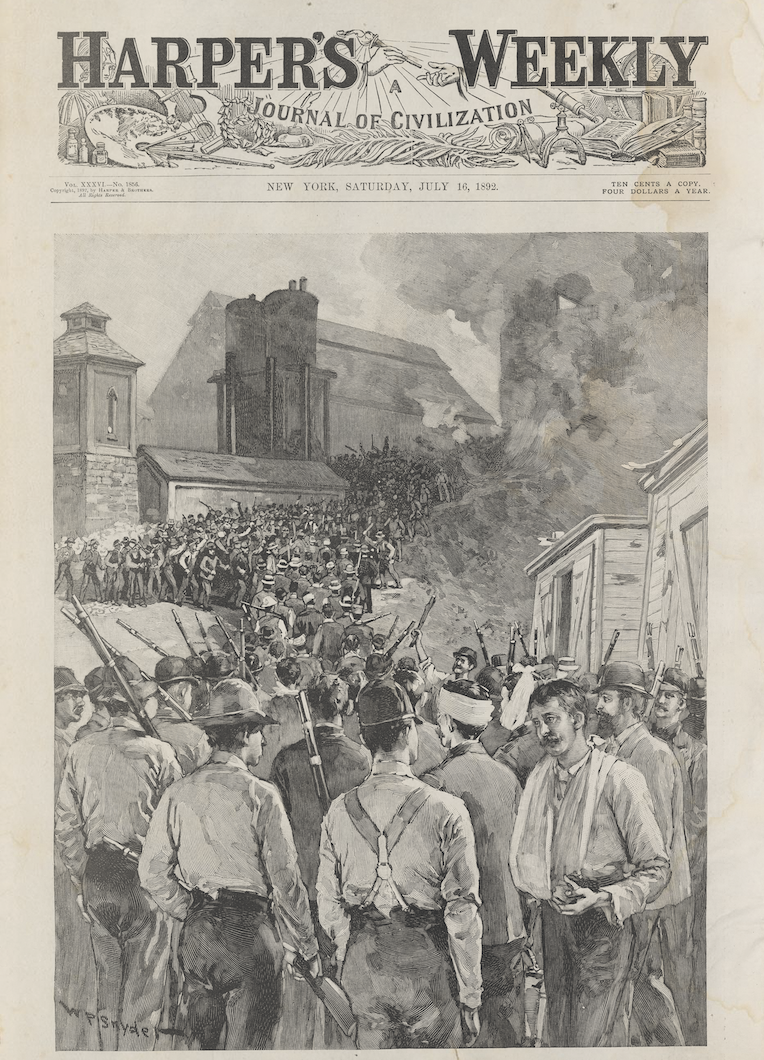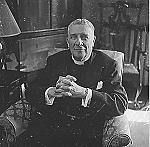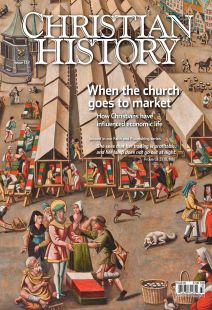Avoiding shipwrecks

[Surrender of Strikers during the Homestead Strike, Harper’s Weekly, v. 36, no. 1856—Drawn by W.P. Snyder (1892) after a photograph by Dabbs, Pittsburg. / [Public domain] Wikimedia]
In July of 1892, striking steelworkers in Homestead, Pennsylvania, fought a daylong battle with private security guards hired by the Carnegie Steel Company. By the time the state militia was called in to quell the violence, 16 people had died and Americans had wakened to the fact that the conflict between labor and capital was a serious matter. The controversy at the Homestead plant was resolved in favor of the steel company, but the country was looking for broader solutions. Some found wisdom in an unlikely place: the words of the supreme pontiff of the Roman Catholic Church.
One year earlier in 1891, Pope Leo XIII had issued the encyclical letter Rerum novarum (often translated as “revolutionary change”), which ushered in what has become known as modern Catholic social teaching. Popes had spoken of world events before, but Leo’s systematic response to social problems was different. He was especially concerned with the relationship between capital and labor, arguing that conflict between those who worked for wages and those who paid them must be allayed if the world was to achieve peace and prosperity for all.
Unfortunately, the pope observed, separation between the two groups was growing. Marxist socialists exploited the alienation of the working classes for the sake of revolutionary political ends, while capitalists took advantage of financial power to increase their own advantages at the expense of their employees. Leo said that Christianity offered a better way forward.
Leo’s foray into economic affairs paradoxically stressed spiritual realities. He warned “those whom fortune favors” that “riches do not bring freedom from sorrow and are of no avail for eternal happiness, but rather are obstacles . . . and that a most strict account must be given to the Supreme Judge for all we possess.” At the same time, he assured “those who possess not the gifts of fortune” that “in God’s sight poverty is no disgrace, and that there is nothing to be ashamed of in earning their bread by labor.” Focusing on the teaching and example of Jesus, Leo believed, would temper the pride of the wealthy and hearten the spirits of the poor, making possible a resolution of the conflict that was shaking the social life of the Western world.
A spiritual and material vision
This spiritual vision, the pope was careful to explain, did not exclude material responsibilities; he wrote that the church’s emphasis on virtue was, in fact, one answer to the problem of poverty, encouraging generosity in the rich and frugality in the poor. But the church also acted directly to alleviate economic suffering. Leo highlighted the role of religious orders and other Catholic institutions in serving those in need.
The pope’s comments on politically charged questions made the biggest splash, though. Against socialist agitators, he argued for the sanctity of the family and of private property. Against advocates of laissez-faire economics (from the French for “let it be”)—an approach that avoided regulation or intervention—he insisted on workers’ rights to just wages and the freedom to form labor associations. While he warned that the state “must not absorb the individual or the family,” he encouraged government action when necessary: “Whenever the general interest or any particular class suffers, or is threatened with harm, which can in no other way be met or prevented, the public authority must step in to deal with it.”
The pope’s intervention in economic matters caused a sensation across the Western Christian world. In the United States, Baltimore’s Cardinal James Gibbons had interceded just a few years earlier to prevent a potential Vatican condemnation of the Knights of Labor, a labor federation. Now champions of the working class hailed Rerum novarum as the harbinger of a church newly sensitive to the plight of the wage laborer.
Hundreds of labor unions promoted the encyclical as an endorsement of their aims. The US commissioner of labor described it as “the foundation for the proper study of social science in this country” and claimed it had “an immense influence in steadying the public mind.” Congregationalist minister Lyman Abbott, a proponent of the Social Gospel, extolled it as “a true statement both of our social disorder and of the direction in which we are to look for a remedy.” His fellow progressive Washington Gladden praised the pope’s “large intelligence and quick human sympathy.”
Rerum novarum was not the papacy’s final word on economics. In fact the word “market” does not even appear in that text, focused as it was on the relationship between capital and labor. But Leo’s letter set in motion a series of such documents as successive popes followed his example in issuing commentaries on economic affairs—often on the anniversary of Rerum novarum.
A moral market
Forty years later, in the midst of the Great Depression, Pope Pius XI published Quadragesimo anno (1931). Pius’s treatment of economics exemplified the dominant papal approach. It recognized the legitimate role of the market and its essential features—competition, prices, and profit—but also sternly insisted that economic action must be bounded by legal and moral limitations. “The right ordering of economic life cannot be left to a free competition of forces,” Pius warned; there must be a “juridical and social order which will, as it were, give form and shape to all economic life.”
Economic activity unbridled by legal or moral checks, Pius pointed out, destroyed the effectiveness of the market that it exploited. The pope did not oppose competition; he opposed reckless competition that ultimately undermines freedom. “Free competition has destroyed itself,” he lamented, and “economic dictatorship has supplanted the free market.”
John XXIII’s Mater et magistra (1961)—appearing 30 years later on the cusp of a decade of ecclesial and cultural turmoil—maintained this call for balance between “the power of the public authority” and individual “freedom of action.” John Paul II also wrote two anniversary encyclicals, Laborem exercens (1981) and Centesimus annus (1991). In Laborem he focused on the theology of work rather than on the economy as a whole, but his approach was consistent with that of his predecessors, reproaching attempts to consider human labor “solely according to its economic purpose.”
In Centesimus John Paul offered the fullest assessment of economic life in the papal tradition. “Market“ appears 27 times in the text, by far the most of any encyclical. He acknowledged the efficiency of free market exchange, but also observed that “there are many human needs which find no place on the market.” Much like Pius XI, he advocated an economic system that is “not directed against the market, but demands that the market be appropriately controlled by the forces of society and by the State, so as to guarantee that the basic needs of the whole of society are satisfied.”
The interpretation and application of this papal social teaching was a matter of controversy from the beginning. John XXIII cautioned that “differences of opinion in the application of principles can sometimes arise even among sincere Catholics. When this happens, they should be careful not to lose their respect and esteem for each other.”
Twin rocks of shipwreck
John Paul II later clarified that popes were not attempting to give specific policy advice: “Models that are real and truly effective can only arise within the framework of different historical situations, through the efforts of all those who responsibly confront concrete problems in all their social, economic, political and cultural aspects.” What the church offers instead is an “indispensable and ideal orientation” to guide reflection and action in the economic sphere. The popes always urged policymakers to avoid what Pius XI called the “twin rocks of shipwreck”: individualism and collectivism—either the liquidation of private property or a market with no state intervention.
What has most often gotten lost in tussles over Catholic social teaching is a point that Leo emphasized and that all the encyclicals share: the primacy of the spiritual. Without sound religion, the popes argued, social problems will prove intractable.
Their very engagement of social and economic life by appealing to both the gospel message and common human aspirations was itself a statement. By articulating a social teaching, they undertook a mission many Christians supported and admired: to remind an increasingly secular world that every aspect of human activity is subject to the teaching of Christ. CH
By Kevin Schmiesing
[Christian History originally published this article in Christian History Issue #137 in 2020]
Kevin Schmiesing is director of research at the Freedom and Virtue Institute, a research associate at the Veritas Center for Ethics in Public Life, and author of five books including Merchants and Ministers: A History of Businesspeople and Clergy in the United States.Next articles
Friendly economics
How Quakers in North Carolina used the marketplace to free enslaved people from bondage
Christina HitchcockWhat would Jesus do in business?
The rise, struggles, and promise of the faith and work movement
David W. Miller





